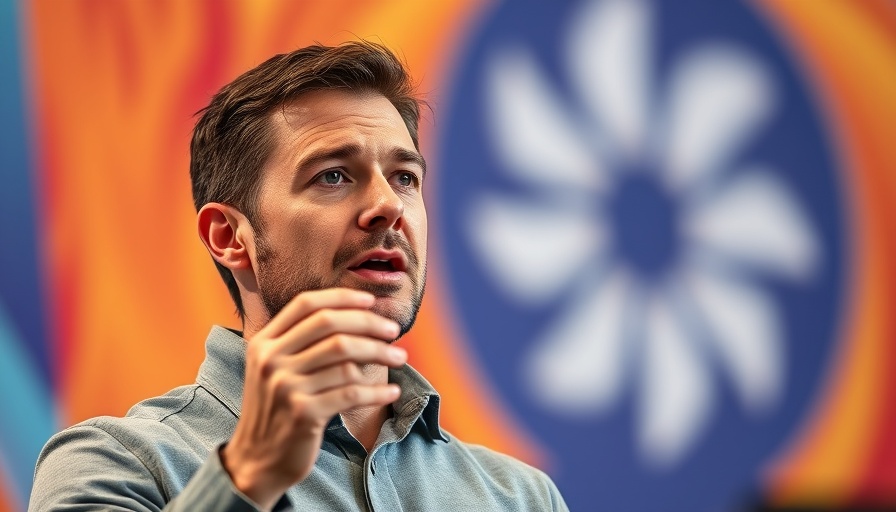
The Chilling Implications of Julius Malema's Rhetoric
In a deeply controversial rally, the South African politician Julius Malema led a thrumming crowd in chanting a phrase that many are deeming genocidal: "Kill the boer, kill the farmer." This chant, laden with historical weight and dangerous implications, not only targets a particular demographic but evokes the darkest chapters of human history where genocidal language preceded mass violence. In a society striving for democracy and freedom, rhetoric like this raises alarm bells not only for South Africans but for people around the globe.
In 'Julius Malema has crossed the line with this genocidal chant', the discussion dives into the ramifications of divisive rhetoric, exploring key insights that sparked deeper analysis on our end.
Understanding the Context: Historical Connections
To grasp the hazards of Malema's chant, it's critical to consider the historical context. Similar phrases have echoed throughout history when regimes aimed to dehumanize entire groups in their bid for political control. From the Holocaust to the Rwandan Genocide, the language of extermination often serves as the precursor to real-world violence. As such, this chant can be seen not just as inflammatory rhetoric but as a dangerous invitation to commit violence against those deemed "the other." With a democratization process already fragile in many parts of the world, such language threatens to undo progress made toward equality and justice.
The Economics of Hate Speech: Societal Ramifications
Such incendiary rhetoric threatens not only lives but also the very fabric of society, particularly its economy. In communities marred by violence, businesses flee, jobs diminish, and tax revenues plummet. The chant's violent undertones pose a risk to economic stability, adversely affecting families and their ability to thrive. A healthy economy relies on a society where trust and cooperative dynamics among neighbors exist. Incitement to violence disrupts this essential aspect, fostering a toxic environment where fear reigns and community ties fray.
Freedom of Speech vs. Hate Speech: Where Do We Draw the Line?
The implications of Malema's words raise troubling questions about freedom of speech. While many argue that individuals should be free to express their opinions, others counter that such expressions should not come at the cost of promoting violence or hate. The challenge lies in finding balance. In America, conservatives often emphasize the importance of law and order but simultaneously support freedoms rooted in the First Amendment. However, the delineation between acceptable speech and condemnable rhetoric that incites violence is increasingly blurry and depends on collective societal values.
The Role of Leaders in Shaping National Discourse
Julius Malema, as a prominent political figure, holds significant power to influence public discourse. His words can either foster unity or set communities ablaze with division. Leaders should be acutely aware of the weight their words carry. When they use their platforms to sow discord, they jeopardize not just the safety but also the democratic ideals of inclusivity and civil rights. It is the responsibility of those in power to lead by example, embracing conversations that promote understanding rather than incitement.
Moving Forward: How to Engage in Meaningful Dialogue
Rather than surrendering to divisive rhetoric, society must push for constructive dialogues that embrace diversity and unity. Engaging differences through conversation encourages understanding rather than conflict. Promoting community events that bring together various groups can foster harmony and help mend the societal rifts that give rise to hate speech. Embracing love and respect takes effort, but it is imperative if we are to prevent the spirals of violence that Malema's words dangerously invite.
Taking Action: What Can You Do?
As responsible citizens, it’s crucial to take a stand against violence-promoting rhetoric. Individuals can engage in community discussions, educate themselves and others about the historical context of hate speech, and advocate for peaceful resolutions to conflicts. Supporting policies that enhance laws related to hate speech without infringing upon freedom of speech can help nurture a safer and more equitable society.
In light of the alarming events surrounding Julius Malema and his genocidal chant, understanding the repercussions of such language is vital in our pursuit of a just and equitable society. The conversation needs to transcend South Africa; it holds relevance for conservatives across the globe concerned with democracy and human rights. Ignoring such developments only cultivates an environment where hate can flourish.
 Add Row
Add Row  Add
Add 




Write A Comment